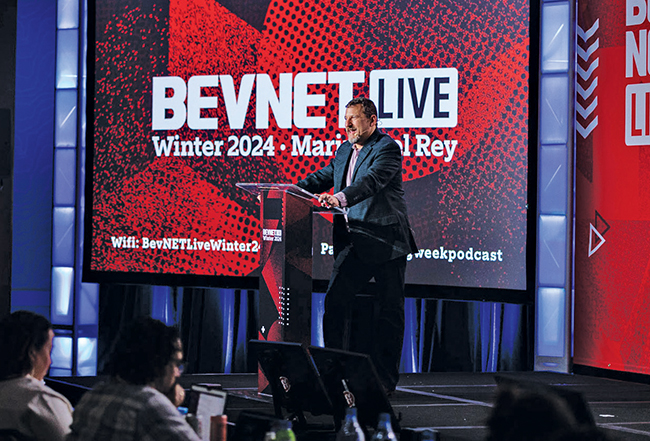BevNET Live Winter 2024 Recap
The 2024 edition of BevNET’s annual winter conference in Marina Del Rey brought the expected high levels of energy and excitement across the two-day event in December.
A wide range of topics were discussed but the recurring theme among beverage business entrepreneurs, investors, experts, distributors and retailers presenting on-stage was how to succeed in a time of economic uncertainty and what the true meaning of category-disrupting innovations is.
In a presentation that kicked off the first day, Craig Dubitsky discussed how he’s bringing his experience creating “joyful” CPG brands into his new coffee venture happy, co-created with actor Robert Downey, Jr.
“I’m allergic to this word ‘disruption,’ Dubitsky said during the presentation. “It’s not about disrupting anything. No one ever said, ‘honey, next time you’re getting some toothpaste, can you get me some of that Hello toothpaste, they’re such challengers the way they disrupted my routine.’ No one says that.”
Dubitsky, who has also founded breakthrough brands such as cleaning products company Method, lip balm maker Eos and toothpaste company Hello, believes that in order for a product to bring the type of magic that upends a category, it has to innovate with emotion in mind.
Later in the day, a diverse panel including Rocana Venture’s co-founder and general partner Gurdeep Prewal, Willow Growth Partner’s founder and general partner Deborah Benton and Barrel Ventures managing partner Nate Cooper discussed whether or not VC cash is right for your business is dependent on the firm itself and the relationships a founder has built.
“Beverage can be a fantastic VC investment, because the outcomes can be huge, and have been huge, which is very much in alignment with how venture capital and portfolio construction for venture capital works,” said Benton. “Why it may not be a great investment for venture capitalists, candidly, a lot of VCs [don’t] know beverage very well.”
She cautioned founders to seek out firms that at the least are focused on the space or are run by former operators. Prewal added that raising at any stage, even for the VCs themselves, is extremely difficult in the current market. Cooper said he believes money will begin to move once again, as long as there are more exits to PE and dollars flowing from other streams beyond “the big three.”
Closing out day one, Cameron Gould-Saltman, TikTok Shop’s head of food and beverage explained that companies that have seen success on the platform are taking a creator-first approach to building their reach. While they must be comfortable ceding some control to influencers and creators, he believes this approach has been most effective to authentically build followings for a new storefront and introduce U.S. consumers to the concept of shopping via social media.
During the event’s second day, Recess founder and CEO Ben Witte discussed how brands establish new categories. He told the audience that although CBD was a pivotal first step for establishing the business as being at the forefront of the emerging relaxation drinks sector, he “saw the writing on the wall” that the regulatory environment would not turn in the ingredient’s favor. So, business innovated and evolved while Witte made sure not to lose sight of the core proposition around the relaxation need state he was confident would remain in vogue with or without cannabidiol.
CBD-infused Recess products are still on the market, but they now represent less than 10% of the business’ sales, whereas its mocktails are over 90%.
“Consumers buy solutions, not ingredients,” Witte said. “I really believe it’s important to focus on the key value propositions and the specific occasions and need states you’re most relevant for.”
Later in the day, Thirstwell founder and CEO Brandy Rand picked back up on the subject of rising demand for relaxation drinks in a session focused on how cultural shifts have led to changes in how consumers “drink their feelings.” She pointed to a decline in American happiness, dropping from the 15th happiest country in the world to 23rd, out of 140 tracked nations, according to at least one survey.
In response, she said brands could benefit from working to uplift consumers who are feeling down through positive messaging and upbeat ad campaigns.
“Marketing through feeling for beverages is not a revolutionary thing, the biggest companies in the world have done this for decades,” Rand said, pointing to trends during the 2008 recession when brands like Coca-Cola mounted marketing campaigns focused on happiness and “lifting people up” that proved highly successful.
For founders facing the ultimatum of “get profitable or get packing” amid economic uncertainty, LifeAID founders Orion Melehan and Aaron Hind walked through some of the steps they took to get to this point and aimed to demystify at least some of the fog that surrounds the path to profit.
Among the steps they took included hiring a proper accounting team to identify inefficiencies, optimizing inventory and learning how to prioritize their key accounts, slashing marketing and reducing payback periods, and – hardest of all, they said – layoffs. In the end, the business accrued 24% in savings and is still running at a profit today.
Achieving profitability, Melehan said, is a key to longevity for a brand, and suggested it can be a proper marker of success.
Closing out the event, New York City-based hydration beverage brand Recoup took home the New Beverage Showdown title in a tight competition that featured five other finalists, including Dappy non-alcoholic functional beverage, Passion Joy sparkling passion fruit beverage, Melo sparkling kava drink, Guinep non-alcoholic cocktail, and Grind with Gratitude performance water and THC-infused seltzer.


Receive your free magazine!
Join thousands of other food and beverage professionals who utilize BevNET Magazine to stay up-to-date on current trends and news within the food and beverage world.
Receive your free copy of the magazine 6x per year in digital or print and utilize insights on consumer behavior, brand growth, category volume, and trend forecasting.
Subscribe